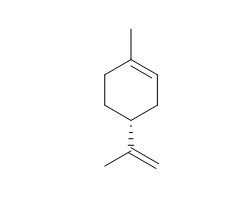(R)-(+)-Limonene
(R)-(+)-Limonene exhibits antihyperalgesic effects against mechanical hyperalgesia, and it also has antidepressive,antianxiety,and anti-inflammatory activities.
Inquire / Order:
manager@chemfaces.com
Technical Inquiries:
service@chemfaces.com
Tel:
+86-27-84237783
Fax:
+86-27-84254680
Address:
1 Building, No. 83, CheCheng Rd., Wuhan Economic and Technological Development Zone, Wuhan, Hubei 430056, PRC
Providing storage is as stated on the product vial and the vial is kept tightly sealed, the product can be stored for up to
24 months(2-8C).
Wherever possible, you should prepare and use solutions on the same day. However, if you need to make up stock solutions in advance, we recommend that you store the solution as aliquots in tightly sealed vials at -20C. Generally, these will be useable for up to two weeks. Before use, and prior to opening the vial we recommend that you allow your product to equilibrate to room temperature for at least 1 hour.
Need more advice on solubility, usage and handling? Please email to: service@chemfaces.com
The packaging of the product may have turned upside down during transportation, resulting in the natural compounds adhering to the neck or cap of the vial. take the vial out of its packaging and gently shake to let the compounds fall to the bottom of the vial. for liquid products, centrifuge at 200-500 RPM to gather the liquid at the bottom of the vial. try to avoid loss or contamination during handling.
Kyung Hee University2024, 4789969.
Food Funct.2022, 13(13):6923-6933.
Environ Toxicol.2023, 38(5):1174-1184.
Horticulture Research2023, uhad259
Eur Endod J.2020, 5(1):23-27.
Environ Toxicol.2024, 39(5):2927-2936.
Res Rep Urol.2022, 14:313-326.
Vietnam Journal of Food Control.2022, 5(2): 115-128.
Sci Rep.2024, 14(1):3684.
Agronomy2020, 10(3),388.
Related and Featured Products
Nutritional Neuroscience, 2015, 18(5):217-224.
Antihyperalgesic and antidepressive actions of (R)-(+)-limonene, α-phellandrene, and essential oil from Schinus terebinthifolius fruits in a neuropathic pain model.[Reference:
WebLink]
Previous studies have shown that essential oil containing (R)-(+)-Limonene and α-phellandrene, extracted from fruits of Schinus terebinthifolius Raddi, exhibit anti-inflammatory activity.
METHODS AND RESULTS:
This work aimed to verify the antihyperalgesic and antidepressive actions of (R)-(+)-Limonene, α-phellandrene, and essential oil from S. terebinthifolius fruits in spared nerve injury (SNI) model of neuropathic pain in rats.In the present work, essential oil from fruits of S. terebinthifolius, as well as the pure (R)-(+)-Limonene and α-phellandrene compounds, were assayed for their effects on SNI-induced mechanical and cold hyperalgesia, and depressive-like behavior (immobility in forced swim test) in rats. The locomotor activity was evaluated in open-field test.Oral administration for up to 15 days of essential oil of S. terebinthifolius (100 mg/kg), (R)-(+)-Limonene (10 mg/kg), α-phellandrene (10 mg/kg), and also subcutaneous 10 mg/kg dose of ketamine (positive control) significantly inhibited SNI-induced mechanical hyperalgesia and increased immobility in the forced swim test. On the 15th day of oral treatment, α-phellandrene, but neither the essential oil from S. terebinthifolius nor (R)-(+)-Limonene, prevented the SNI-induced increase in sensitivity to a cold stimulus. The oral treatment with essential oil (100 mg/kg) or with compounds (10 mg/kg) did not interfere on locomotor activity.
CONCLUSIONS:
Together, the results of the present work show that essential oil of S. terebinthifolius and compounds present in this oil, including (R)-(+)-Limonene and α-phellandrene, exhibit antihyperalgesic effects against mechanical hyperalgesia, and are antidepressive, while only α-phellandrene inhibited cold hyperalgesia in SNI rats.
Pharmacology Biochemistry & Behavior, 2013,103:450-454.
Anxiolytic-like activity and GC-MS analysis of (R)-(+)-limonene fragrance, a natural compound found in foods and plants.[Reference:
WebLink]
The traditional use of essential oils in aromatherapy has offered numerous health benefits. However, few
scientific studies have been conducted with these oils to confirm their therapeutic efficacy. (+)-Limonene((R)-(+)-Limonene )
is a chemical constituent of various bioactive essential oils.
METHODS AND RESULTS:
The present study reports on the anxiolytic-like
effects of (+)-limonene in an elevated maze model of anxiety in mice. At concentrations of 0.5% and 1.0%,
(+)-limonene, administered to mice by inhalation, significantly modified all the parameters evaluated in
the elevated plus maze test. The pharmacological effect of inhaled (+)-limonene (1%) was not blocked by
flumazenil. Analysis of (+)-limonene using gas chromatography–mass spectrometry (GC–MS) showed its
volatility to be high. These data suggest possible connections between the volatility of (+)-limonene and
its anxiolytic-like effect on the parameters evaluated in the elevated plus maze test.
CONCLUSIONS:
The data indicate that
(+)-limonene could be used in aromatherapy as an antianxiety agent.



